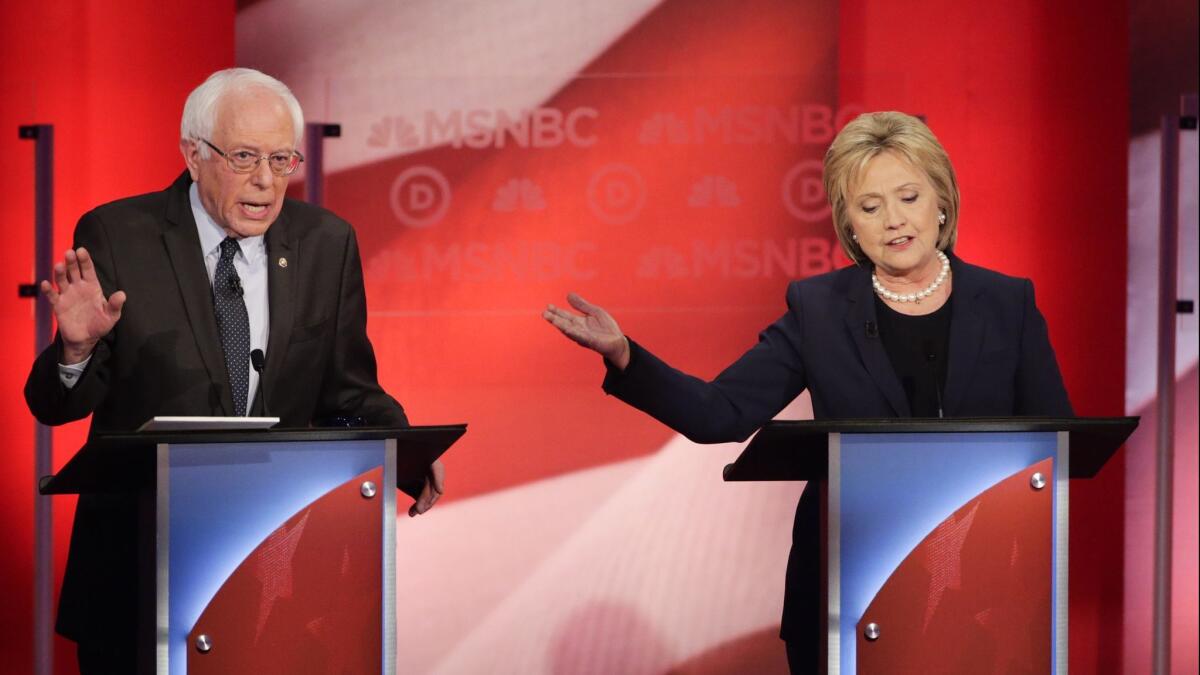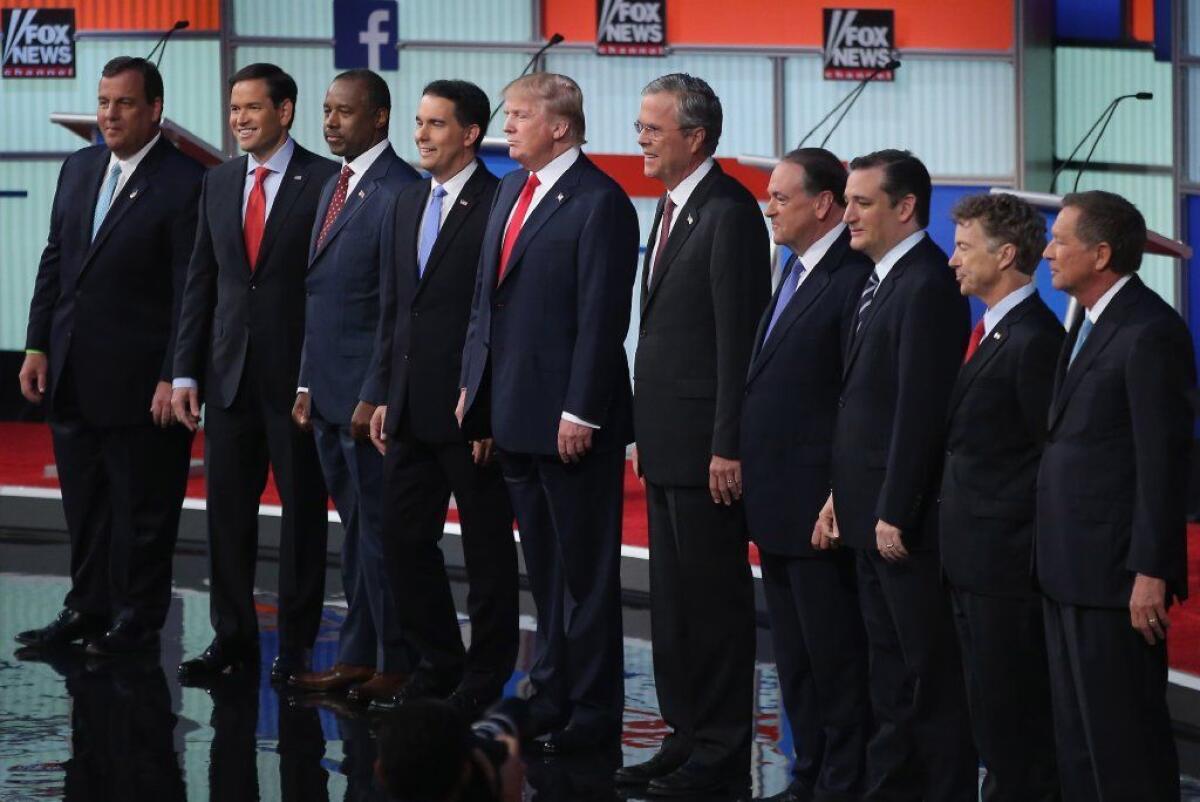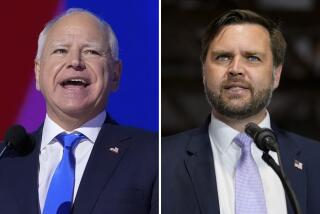Will the Democratic presidential primary debates be a boom or bust for TV news?

- Share via
The start of the 2020 race for the White House means the return of one of TV’s biggest and unlikely hits of recent years — the presidential primary debates.
Once appointment viewing for political junkies and C-SPAN addicts, the face-off between contenders for their parties’ nominations became an unexpected ratings bonanza four years ago.
The first meeting of the Republican candidates on Aug. 6, 2015, in Cleveland was watched by 24 million viewers on Fox News, the biggest audience in history for a cable news program and the most ever for a primary debate on any network. The GOP showdown that aired a month later on CNN was not far behind with 23 million. Rates for 30-second commercial time on the events surged into the low six figures, more than 10 times the typical price for prime-time cable news shows.
Those viewing levels likely got a boost from the presence of then-candidate Donald Trump on the debate stage. News executives and political experts believe the Democratic debates — the first airing June 26 and 27 on NBC, MSNBC and Telemundo and the second on July 30 and 31 on CNN — will also have robust audiences, as surveys show voter interest in who will face Trump at the polls next year is stratospheric.
“We are looking at numbers that I expect to see in the late summer of 2020, not the early summer of 2019,” said Fox News politics editor Chris Stirewalt. “Both parties are highly engaged.”
But even the biggest hit shows are subject to format tweaks and cast changes that can polarize viewers, and the primary debates are no different. The first event will have 20 of the 23 announced candidates, who met polling and fundraising criteria set by the Democratic National Committee. They have been randomly split into groups of 10 each night.
With so many candidates onstage in the two-hour programs, there are concerns the nights could be as crowded and informative as a WWE Royal Rumble.
“If a candidate is lucky and persistent, he or she may get 10 minutes, and that’s with interrupting and taking more time than you’re entitled,” said Larry Sabato, director of the University of Virginia’s Center for Politics. “You can have the battle of the soundbites and that is not a very good indicator as how someone would perform as president.”
Mark Lukasiewicz, dean of the Lawrence Herbert School of Communication at Hofstra University who produced more than a dozen debates during his years at NBC News, also fears that the crowded stage could become “the battle of the political stars rather than a real exchange of ideas.”
Ten candidates on a stage is not unprecedented — Fox News and CNN had that many Republicans in their first events in 2015. But they were the top polling candidates out of a field of 17, with the rest of the field appearing in a separate debate airing before the main event.
The Democratic National Committee sought to avoid an event solely made up of second-tier candidates, which in the 2016 cycle became derisively known as “the kids table.”
“They wanted everyone who qualifies to be treated equally,” said Rick Klein, political director for ABC News, which will have a Democratic primary debate in September. “The fact is that there are some nontraditional candidates, and the last cycle proves they can actually become president. They wanted to establish that in the rules.”
The lottery method used by NBC News to determine the lineups resulted in only one of the top-polling candidates — Sen. Elizabeth Warren of Massachusetts — appearing on the first night, separating her from her top rivals, former vice president Joe Biden, Sen. Bernie Sanders of Vermont, South Bend, Ind., Mayor Pete Buttigieg and Sen. Kamala Harris of California, who face off on the second night. The split is considered less than ideal for those looking for a direct match-up that could change the dynamic of the race for the nomination.
“Not having Elizabeth Warren and Joe Biden on the same stage is unfortunate and a missed opportunity,” said Lukasiewicz.

Stretching the event over two nights is also a bit of wild card. CNN Washington Bureau Chief Sam Feist said the 22 hours between the two nights could serve as a “half-time show” where candidates will be able to make their views heard and stoke interest in the second debate.
“The candidates on the first night will have the opportunity to appear on programs on the second night,” Feist said. “There is no shortage of opportunity for candidates to appear on television and talk to political reporters.”
Rashida Jones, senior vice president of specials for NBC News, said her division is introducing the candidates in the days leading up to its events, which will also be shown on the newly launched free streaming service NBC News Now. “NBC Nightly News with Lester Holt” has been giving each contender a forum on a segment called “My Big Idea.”
The network’s digital platforms are also offering background pieces on the vast array of candidates, who will be questioned at the debate by Holt, “Today” co-anchor Savannah Guthrie, “Meet the Press” moderator Chuck Todd, “NBC Nightly News” Saturday anchor Jose Diaz-Balart and MSNBC host Rachel Maddow.
“We’ve never had a two-night event like this or a pool as diverse, not only in how they identify but also in their points of view,” Jones said. “I think the curiosity factor is going to drive a lot of this.”
Even with the large number of candidates — which is expected to thin out over time — the debates are coveted by the networks, as they offer a chance to reach a wide swath of viewers with an event that becomes the focus of the news cycle for days.
In previous presidential cycles, broadcast networks aired primary debates on Saturday, when prime-time viewing is at its lowest level of the week.
But as ratings for prime-time entertainment shows continue to diminish, ABC, CBS and NBC are gladly making time available on weeknights, when more people are available to watch, as 15 of the 2016 presidential primary debates drew 9 million viewers or more — an impressive figure in the current fragmented TV environment.
CBS News is in talks with the Democratic National Committee about carrying a debate early next year. Fox News Channel, which has not aired a Democratic debate since 2004, is continuing to lobby for one in the 2020 cycle.
In April, DNC Chairman Tom Perez decided not to give Fox News a debate because of the Rupert Murdoch-owned division’s reported close ties to the Trump White House. Several of the commentators at Fox News, including Sean Hannity, are known for offering advice to the president.
Fox News has countered by noting the strong ratings and generally positive reviews for the hourlong town hall programs it has staged in recent months for several 2020 Democratic candidates, including Sanders and Buttigieg. Fox News also cites Nielsen data from 2019 that shows its programming reaches beyond the conservative base. Twenty-four percent of the network’s viewers identify as Democrats, while 33% say they are undecided or “middle of the road.”
Lukasiewicz believes the exclusion of Fox News is the result of the political parties’ national committees having too much influence on the debate process, which he believes should be controlled by journalism organizations that offer their platforms. NBC News lost a Republican-sponsored event in 2015 when GOP leaders were angered at the aggressive questioning by a panel of CNBC journalists at the financial news network’s debate. (CNBC is owned by NBCUniversal but operates separately from NBC News).
“I think the hard news journalists of Fox should get a debate, and I think it’s clear that some Democratic candidates would like to be in front of that audience,” Lukasiewicz said. “I think it was wrong of the Republican Party to deny NBC a debate last time and I think it’s shortsighted for any party to ignore the audience that watches Fox this time around. For better or worse, we do have this fragmented news media landscape right now. To reach the broadest audience, I think you need to be in all of those places.”
More to Read
The complete guide to home viewing
Get Screen Gab for everything about the TV shows and streaming movies everyone’s talking about.
You may occasionally receive promotional content from the Los Angeles Times.







